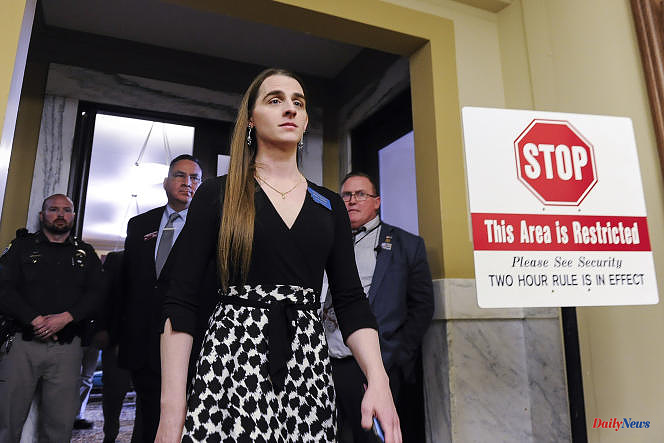The election of Joe Biden, in November 2020, first appeared as a hope for transgender people in the United States. After a series of attacks on LGBT people led by the Trump administration, President Joe Biden, five days after taking office, allowed transgender people to serve in the US military.
The Republican Party, however, has not given up its war against this community. Latest target: Zooey Zephyr. Aged 34, she is the first openly transgender person elected to the House of Representatives of Montana, a state in the northwestern United States.
The one who calls herself an activist for the trans cause since 2020 decided to take the plunge and enter politics the following year. "In 2021, seeing how the right was attacking gay people, I went to testify before the [Montana] House of Representatives," she explains. I met with the Governor's team [Republican Greg Gianforte] to push for transgender rights in the state. She says she felt like she was hitting a wall. "They didn't want to hear anything," she sums up. And for good reason: in May 2021, in less than a week, the Montana State House of Representatives narrowly passed three bills restricting LGBT rights.
On Twitter, she then declares that she could have prevented this vote if she had been elected. She is therefore running for the Democratic Party, in the 2022 midterm elections, in a progressive constituency. Based in Missoula, a Democratic city of 75,000, she was elected in November to the Montana House of Representatives, and has sat since January alongside SJ Howell, the first non-binary person (who does not identify with either the male gender or the gender) elected in Montana.
"I hope you see the blood on your hands"
There, she rails against Senate Bill 99, the Youth Health Protection Act, which seeks to make gender transitional care inaccessible to transgender minors. She puts so much ardor into it that the Republican majority in the House decides to censor her, accusing her of remarks deemed inappropriate.
On several occasions, during the debates, she criticized the desire of the Republicans to pass a law prohibiting the delivery of hormonal treatments to transgender minors to ensure their transition. "The next time (…) you bow your head in prayer, I hope you see the blood on your hands," she told them on April 18, saying that such laws push transgender people to commit suicide, supporting studies.
In retaliation, a group of twenty-one Republicans signed a letter demanding the "censorship" of the elected official. In it, they refer to her using a masculine pronoun, ostensibly misleading her. In a statement, she explained that Parliament "refuses to allow [her] to speak on any bill until the end of the legislative session" unless she apologizes. The elected official denounces a "fundamentally undemocratic decision" by the Republicans, intended to guarantee "silence as they suppress the rights of the transgender and homosexual inhabitants of Montana".
Matt Regier, the Republican Speaker of the House, eludes and recalls that the rules of the institution allow the floor to be withdrawn from an elected official who does not respect the protocol. “All elected members of the House can debate as long as they follow the rules. The choice not to follow these rules is the one chosen by the chosen Zephyr. The only person who censors Chosen Zephyr is Chosen Zephyr. The Montana Chamber won't take a beating. He demands that she apologize for reinstating her, which she refuses.
"Silence Us"
Seven people demonstrating in his favor were arrested on April 25. In a press release, the elected official still denounces her exclusion, seeing it as an attack on democracy and an affront to the LGBT community: "When I stood up to say that there is blood on your hands, I didn't was not hyperbole. She asked the judiciary to reinstate her to allow her to participate in the end of the parliamentary session which ends on May 5. In a five-page ruling, a Montana judge said the decision is not within his purview: Granting Zooey Zephyr's request "would require this court to interfere with legislative power [that] which is beyond the authority of [ the courtyard ".
Since then, the elected has continued to follow the work of the House from outside the hemicycle and to communicate with these fellow Democrats. The wives of elected Republicans then occupied the bench on which she sat to try to prevent her from following the debates.
Finally, on Tuesday, the elected official was the target of an attempt at "swatting" - a phenomenon consisting of calling the emergency number in the United States and pretending that a serious situation was at a specific address so that A special units task force is sent there – just like Erin Reed, his partner, a transgender journalist residing in Maryland. “Those who hate transgender people do everything in their power to silence and harm us. But we won't be deterred,” the chosen one tweeted about the incident.
Suicidal thoughts
This standoff is the latest example of the cultural battle between Republicans and Democrats on the issue of transgender people. Since January, twenty-nine new laws restricting the rights of transgender people have been adopted in fourteen American states, according to an analysis of data from the civil rights association ACLU, published in late April by the Washington Post. The association reacted on May 1 to the suspension of Zooey Zephyr, denouncing a decision that is “authoritarianism”.
More than 56% of transgender youth have had suicidal thoughts in their lifetime and 31% have attempted suicide at least once, according to the American Academy of Pediatrics. The studies available on the subject show that when they have access to puberty blockers or hormonal treatments before coming of age, these young people have better mental health, suffer fewer suicidal thoughts, major mental disorders and have fewer substance addiction. But many Republicans denounce the irreversible effects of some of these treatments and want to ban them.












